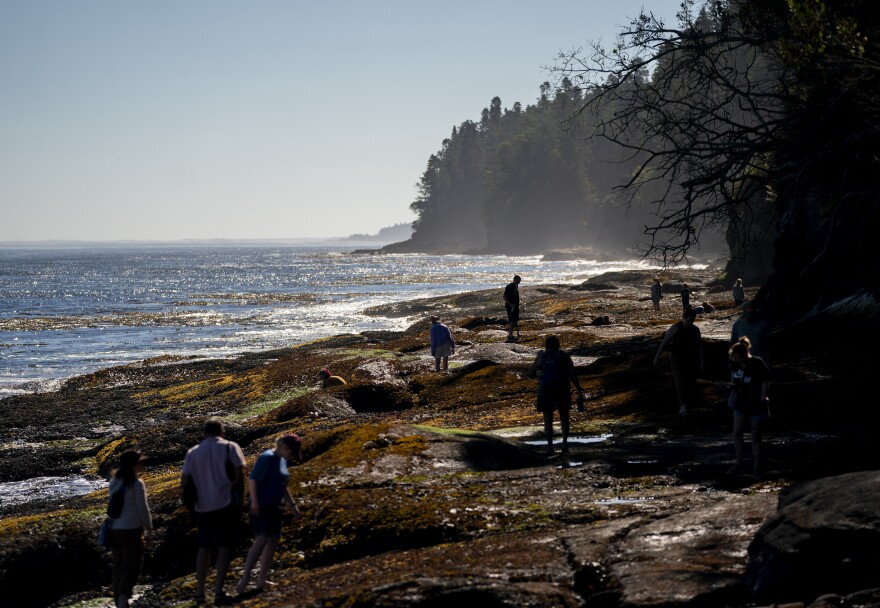Over the last two weeks, Maine Public has been spotlighting invasive plants and other pests that are causing havoc on ecosystems across the state.
But some scientists say that the most destructive invasive species are humans. Wildlife populations have plunged over the past few decades, with experts pointing to human-caused climate change, pollution, and natural resource exploitation as the drivers of much of that trend.
In a 2021 study, University of Maine Associate Professor Jacquelyn Gill, and several other researchers, found that humans have reshaped nearly every corner of the globe for at least 12,000 years.
But Gill told Maine Public's Robbie Feinberg that while human activity has caused substantial environmental damage, she sees a path forward — if we change how we interact with nature.
This transcript has been lightly edited for clarity:

Gill: What's important to remember is that the impacts that humans have had in these ecosystems are not just a monolith, right? They're not just uniformly negative.
In fact, if you look at where we see the most biodiversity on the planet today, 80% of our species are on Indigenous lands. And so what that tells me, is that it's not just the presence of people, that's a problem, right? People are not inherently bad. It's particular kinds of relationships, and ways of relating to the natural world, that are actually the problem. It's these extractive relationships that we see in certain kinds of cultures. But those relationships are not universal. They're not practiced by all people everywhere.
And so it's really important to make distinctions when we talk about — humans are people. And remember that not everyone is the same, everywhere in the world, when it comes to how we relate to the natural world, how we think of nature, as, either having a relationship to us as a set of resources that we are here to extract and use, or perhaps instead to have more of a stewardship relationship, more of a kinship relationship, as we might see with other cultures.
Feinberg: You just mentioned that areas under Indigenous management are some of the most biodiverse areas that are left on this planet. What does that signal to you about what our relationship should look like with with nature going forward, or how we should approach these things if we want to have a biodiverse world?
So the first thing that that tells me, is that the solution to our biodiversity crisis is not to remove people from nature, right? We have an intrinsic connection with the natural world, we came out of it, we are of it and within it.
And in many cases, biodiversity in many places depends on the presence and the actions of people. Whether we're talking about fire, for example, which is a tool that people have been using for millions of years, and that has shaped the trajectory of ecosystems. It creates new kinds of habitats that allows different types of species to thrive. And so not all of the actions that people have in nature are inherently negative, some of them are actually quite important for the persistence of different ecological processes.
And so when I look at conservation efforts that aim to eliminate people, to cordon off nature and keep people out, I think that that is not only unnecessary, but it might actually undermine some of our conservation efforts. Especially in cases where, with climate change, we might need more active human intervention. We might need to help species get to the climates that they need to be in order to survive into the future.

So I would say that if we could take a page from many Indigenous cultures throughout the world, and rather than trying to eliminate people from the natural world, in order to protect it from us, we should be really focusing on changing how we think about our own role in nature, and move towards relationships based on reciprocity, kinship and stewardship relationships, rather than extractive ones.
Do you see indications that governments, NGOs, are moving in this direction at all, of thinking about conservation that way?
I would say that it's mixed, I'm seeing a growing number of initiatives that recognize the value of listening to Indigenous experts who have thousands and thousands of years of their own peer-reviewed process of of really understanding their own relationship with with nature, and effective methods for stewardship.
On the other hand, I see major conservation initiatives, like the 1/3 earth initiative, where the goal there is to really rope off a large portion of the natural world. And when I see those kinds of arguments, a lot of my indigenous colleagues have made a really good point, that that sounds an awful lot like the centuries of land grabs that we've seen happen — that usually the people who lose in those scenarios are Indigenous peoples.
They are people from the Global South, and others, who have contributed the least to the climate and biodiversity crises and are now being asked to basically pay for the impacts of industrial nations. And that's profoundly and deeply unfair, right? They're paying a price for something that they did not contribute to.
And in the end, we're just kind of reinforcing this binary of human versus nature, when what we should really be doing is trying to merge the two in a way that's got more balance to it. And it's more responsive to the needs of both groups.
Support for Deep Dive: Invasives is provided by Maine Audubon, Friends of Acadia and Coastal Maine Botanical Gardens.



